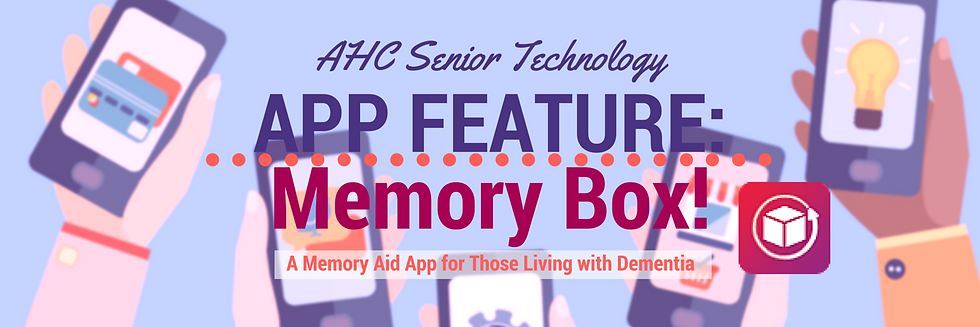Technology Can Help Seniors Lead a Healthier Lifestyle
- Attentive Home Care
- Feb 29, 2016
- 3 min read

As you age, it can be harder to make time to exercise and eat healthily to protect your heart.
Here are 10 ways technology can make staying heart healthy
a little bit easier:
1. Quit Smoking
Apps such as Smoke Reducer (Android) and iQuit (iPhone) can help you quit smoking at the touch of a button. You can also use the Firefox application on your computer -- they have an add-on called Quitomzilla, which shows you how much money you save by not smoking, the number of cigarettes not smoked and the overall time since your last smoke to help encourage you to quit for a healthier heart and body.
2. Maintain a Healthy Weight
The iHealth Wireless Scale is a free app that works with iPod touch, iPhone and iPad that makes it easier than ever to monitor your weight-loss progress. It allows you to track your weight over time, and see the results with regards to daily activity, time of day, diet, exercise and more. The scale lets you set a milestone and share your positive results with doctors, friends and family for extra motivation.
3. Limit Alcohol and Caffeine Intake
Apps for iPhone like DrinkControl or Alcohol Monitor along with SoberApp for Android assist you in keeping tack of how much you're drinking. Isn't it amazing that they can estimate your blood alcohol content and let you know whether or not you should drive? Not only does the application help your health, but it could save lives when your judgement is impaired. Apps like Caffeine Zone 2 for iPhone and iPad or Caffeine Monitor app for Android are perfect for checking that your Caffeine consumption is at a healthy level.
4. Take Care of Your Teeth
Studies show that there may be a link between periodontal disease and heart disease so taking care of your teeth could also mean taking care of your heart! How easy is that? If you visit the American Dental Association's database (www.ADA.org), you can find ADA approved oral health care products and watch videos with oral health care tips.
5. Monitor Your Blood Pressure
Seniors are recommended to monitor their blood pressure at home and visit their doctor regularly. The iHealth Blood Pressure Dock (www.ihealthlabs.com) can help make at home checks easier because it accurately measures your blood pressure, tracks your readings over time and shares that information with healthcare providers, family members and friends. The Dock comes with a blood pressure arm cuff and also charges your iPod touch, iPhone or iPad. It also comes with a free companion iHealth app.
6. Reduce Stress
Do you struggle with stress? Try a portable biofeedback device, like the StressEraser, to help you relax. It works by synchronizing your breathing and your heart rate. If you find yourself overwhelmed with interruptions and responsibilities, try Quiet Hours. It lets you shut down your computer's communication apps, like instant messaging,for a specified period of time for a nice break.
7. Exercise Regularly
The American Heart Association offers an Online Activity Tracker (www.startwalkingnow.org) that lets you create a personalized walking plan, log the time you've walked or the distance traveled and plot and save walking routes. It's perfect for seniors to organize their exercise schedule! You can also use the AHA Walking Paths app for Android and iPhone.
8. Eat Healthily
It's important, as your metabolism slows down, to track the foods you consume and try to understand your caloric and nutritional intake. That's where the Lose It! app for iPhone comes into play. It allows you to enter and track your meals and snacks, monitor your weight loss progress, and set goals. You can also access your account online via www.loseit.com.
9. Prioritize Sleep
Lack of sleep can raise your blood pressure and increase the likelihood of having a stroke or heart attack, especially in the case of elderly people. You can learn more about your sleep patterns by using a sleep monitor. There are headband monitors like Zeo (www.myzeo.com) or armband monitors such as SleepTracker (www.sleeptracker.com). Both track your sleep cycle and help you wake up at the optimal time.
10. Know Your Family's Medical History
Having knowledge of your family's medical history can help you identify patterns that may translate to your own heart health as well. Online tools like My Family Health Portrait (https://FamilyHistory.hhs.gov) help you gather and store family medical history.


































Commentaires